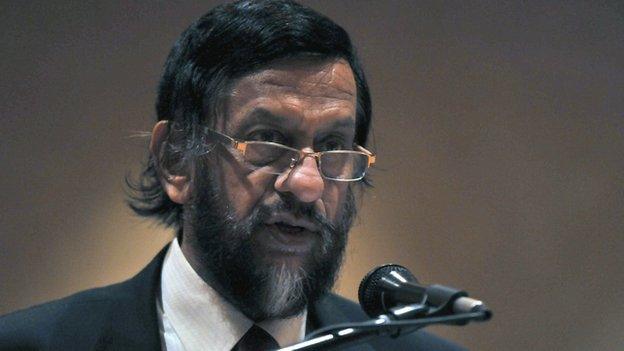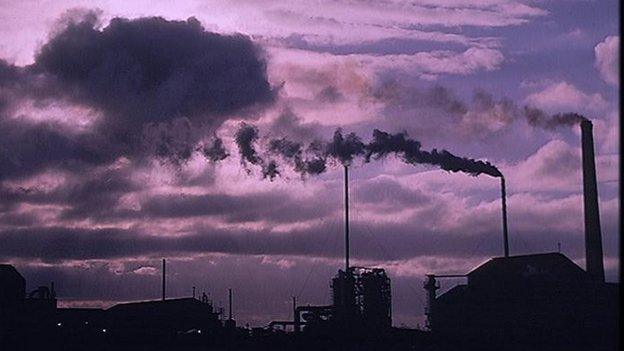Profile: Climate chief Rajendra Pachauri
- Published

Dr Pachauri has chaired the UN's climate panel since 2002
Rajendra Pachauri has stepped down as the chairman of the UN's panel on climate change, a position he has held since 2002. He had to pull out of a meeting in Kenya this week amid sexual harassment allegations he denies.
Dr Pachauri was born on 20 August 1940 in the Nainital district of India.
Privately educated in Lucknow, he went on to study mechanical engineering. After working in management at an Indian railway company, he pursued an academic career in the US, where he held teaching posts.
In the 1990s, Dr Pachauri began working in various capacities for the United Nations (UN) and helped with the research that led to the Kyoto Protocol of 1997.
By 2002, he had been elected to chair the UN's Intergovernmental Panel on Climate Change (IPCC) - the world's authority on climate science - replacing the British scientist Robert Watson.
Dr Pachauri was the favoured candidate of the US Bush administration, which reportedly disliked Dr Watson's willingness to tell governments what he believed to be the unvarnished truth - that human activities were contributing dangerously to climate change.
Honours and awards
The Indian chairman has been honoured for his work on climate change with state awards in India and France.
And in 2007, he collected the Nobel Peace Prize, which was awarded jointly to the IPCC and Al Gore.
He was re-elected to the chairman's role in 2008 and presided over the panel's landmark fifth assessment of climate risks and causes in 2013 and 2014.
He had already been due to stand down in October this year - before the allegations surfaced.
His biography says he relaxes by composing poetry and playing cricket.
But despite the plaudits for the UN panel's work, Dr Pachauri's tenure has been marked by periods of controversy.
A prolific writer of academic reports, he raised eyebrows in January 2010 with the publication of a steamy novel about an Indian climate expert's life and times in India, Peru and the US.
In 2010, he faced calls to resign over a mistaken claim in one of the IPCC's assessments that Himalayan glaciers could disappear by 2035.
Learning from mistakes
The error came to light amid the "Climategate" affair, in which hacked emails from the University of East Anglia's Climatic Research Unit were released on to the web.
Following the controversy, he said the organisation had to learn from recent criticisms and modernise its workings.
"We have to listen and learn all the time and evolve in a manner that meets the needs of society across the world," Dr Pachauri said.
However, he stood by the panel's basic conclusions and denied that the controversy surrounding his position was distracting from the IPCC's work.
Dr Pachauri also dismissed UK press allegations that he has made a fortune from carbon trading thanks to links between private companies and the Delhi-based think-tank Teri, of which he was chief executive.
Any money he earned from advising companies went to Teri, he said, adding: "Not a single penny goes into my pocket."
- Published2 November 2014

- Published30 August 2010
- Published14 May 2010